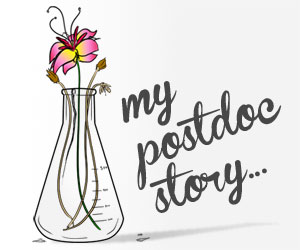My Postdoc Story: Start-Up Company Scientist, Anonymous
by
 While nearly all of us face challenges during our postdoctoral years, we often feel alone in our struggles. In this series, we hope to share encouraging and uplifting stories of how other scientists were able to turn their situation around and move forward, despite a non-ideal situation. Like snowflakes, fingerprints, and nightmares, every postdoctoral experience is unique, so today we share the Postdoc Story of another successful scientist.
While nearly all of us face challenges during our postdoctoral years, we often feel alone in our struggles. In this series, we hope to share encouraging and uplifting stories of how other scientists were able to turn their situation around and move forward, despite a non-ideal situation. Like snowflakes, fingerprints, and nightmares, every postdoctoral experience is unique, so today we share the Postdoc Story of another successful scientist.

I. My Postdoc Story
In grad school I was a chemist. As a postdoc I studied in-vitro diagnostics. Now, I’m a scientist at a start-up company. After completing my degree, I was motivated to do a postdoc because I was missing a large key area of my specialty field, and I wanted to fill some gaps before starting a career. In selecting my postdoctoral lab, I based my decision on the PI’s reputation, the lab’s research focus, and the synergy of the lab members.
Going into the postdoc, I wanted to achieve a better and broader understanding of my field and industrial endeavors therein, and also determine if academia was something I was keen on pursuing. On the road to pursuing my goals, I didn’t expect to encounter a complete lack of communication between lab members both past and present, when to an outsider they seemed like personable people.
II. The Situation
Because the lab’s communication was so poor, wheels constantly had to be re-invented. The PI was too busy to deal with this lack of communication and only focused on positive results. If you couldn’t get positive results, you were publicly berated. Labmates generated data, but it was unclear how due to language barriers, and they would only show good results, even if these results were irreproducible, because they kept the PI happy. The nails that dared to speak against this were immediately hammered down.
III. The Emotions
As someone who has always had experience in labs where good communication was the status quo thanks to good PIs, this was a very frustrating situation. My postdoc PI had no time to advise the younger students, so a lot of that fell to me, and I felt taken advantage of. The public shaming and humiliation was shocking and bordering on abusive, and I got through in large part by relying emotionally on my significant other, my parents, and my Ph.D. adviser, with whom I remain close.
The turning point was the last time the PI publicly talked down to me in a meeting, and it was the straw that broke the camel’s back. It was so bad that it shocked our new postdoc, who had no idea that this sort of thing went on. I applied for 5 jobs the next day.
IV. The Solution
I had long been in contact with my Ph.D. adviser, and when things started to look a little wrong a few months into my postdoc, I let her know. I am glad I did, because there was a documented trail of emails I could follow to track the decline. Finally, she suggested I find another opportunity. My parents, who are also scientists, proposed the same thing.
The PI called me in, and we ended up having a talk and agreeing that we had “different management styles” and this “wasn’t working.” I personally thought these were minor problems amongst the major ones, but I went along with it. The PI then told me I would receive support in any path I chose. I ended up having to write my own recommendation letter for industrial jobs, and my PI modified it slightly and sent it on. I got an offer from a start-up company and took it. I have not been there long, but already I can see the positive effects of good communication, and I am much happier.
V. The Lesson
I stuck it out as long as I could, and I’m glad I tried, but wish I had also been looking for jobs earlier, because then I could have left a bad situation sooner. I think this would be applicable even if my postdoc had been a good experience. I wasn’t sure how to start the process, so when I had to out of necessity, it was quite overwhelming, and I had to learn very quickly.
I wish I had been able to visit my university’s career center and get applicable advice. They mainly catered to the swarms of undergrads, so they were unprepared when a postdoc came looking for career advice. I also wish I had made more industrial connections, though I am still not sure how I would have done that, because I was stuck in the lab trying to reproduce things that were irreproducible.
.
Do you have a Postdoc Story you’d like to share? Email us to let us know.
See how other postdocs remedied difficult situations to find success:
.

